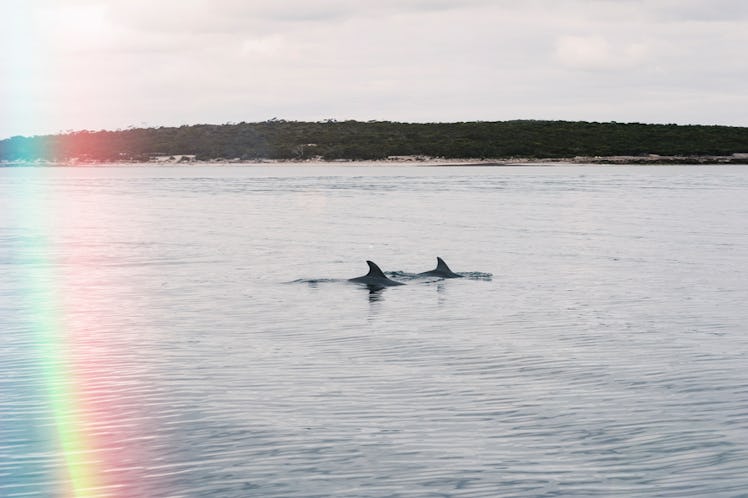
6 Animals That Barely Need Sleep & Basically Have The Greatest Superpower Of All
It doesn’t matter if you prefer waking up at the crack of dawn or lazing in bed until noon. All humans need, on average, six to eight hours of quality sleep every night. In other words, the less you sleep, the more mentally and physically inept you are. So how, then, are there animals that don’t need sleep, that can hunt prey, communicate with and woo their potential mates, and play around to the best of their abilities? Like, am I missing something here?
According to Love Nature, we spend one-quarter of a century asleep by the age of 75. That's 25 years of straight snooze time. Am I the only one who thinks that is a significantly unbelievable waste? Granted, sure, humans need sleep to thrive, so that our brains can operate properly and our physical bodies can move without collapsing and all that jazz, but that's a huge chunk of time and energy that could be spent traveling the world, meeting interesting people, eating all the food, and watching all the Netflix.
Alas, our bodies just aren't really well-equipped to seize the day and live life to the fullest when we're heavily lacking in the sleep department, which just further proves setting a bedtime and sticking to it is vital if we want to perform well at the office, ace that history final, and keep an active social life. Some animals, however, are off the hook here, and it's totally OK to admit you're low-key hating on their superpowers.
Because these miraculous creatures have to deal with things like predators and hunting for food, sleep doesn't top their list of priorities and, luckily for them, it's a non-issue for these six animals if they aren't catching as many hours of Zs as their human companions.
01Dolphins
FYI: I'm about to blow your mind with this little nugget of truth, so get ready.
According to the National Sleep Foundation, dolphins, as well as other aquatic mammals and some species of birds, have what is called a unihemispheric slow-wave sleep. It's a mouthful of a phrase, I know, but this anatomic superpower essentially splits their brains in two, where one half is snoozing while the other stays awake so the animal can push through a nonstop migration.
Seriously, how cool is that? Can humans tap into this? Personally, I'm definitely the type of person who takes forever to fall asleep because I don't want to miss a thing, and if this were possible, I wouldn't have to!
02Giraffes
These beautiful creatures have it rough when it comes to finding comfortable sleep positions, and (no surprise) they can place all the blame on their elongated necks.
Love Nature reports that until the 1950s, it was believed that giraffes didn't sleep at all. But they do, in fact, take power naps standing up, in five-minute increments throughout the day. Unlike humans, who normally sleep lying down, giraffes don't have time to rise and shine while on the lookout for predators, so they clock in their 30 minutes of shut-eye per day with their necks arched or stretched out long.
03Elephants
You'd think that elephants would be up there on the list of animals who need a lot of sleep because their bodies are made of a ton of muscle, and they're just generally humungous. But according to BBC, wild African elephants actually need the least amount of sleep of any living mammal that we know of.
Scientists who analyzed two Botswana elephants' sleep patterns via a fitness tracker that was placed under their trunks found that, compared to the ones you'll find in zoos, these guys only experience REM sleep every three or four days, and sleep maybe two hours per night, if at all.
04Sheep
It's no wonder we've been told to count sheep when we're tossing and turning in bed; it clearly gives them something to do during the night.
These adorable animals stay cute and cuddly without snoozing much at all (I'm a monster when I don't clock in a solid seven hours minimum, so like, I'm impressed). According to the National Sleep Foundation, sheep sleep with their herd, and even if they get less than four hours, they're good to go for the day ahead. What exactly are they drinking, because clearly we need some?
05Deer
The thought of falling asleep with your eyes open is, at least in my opinion, freaky AF, but it's actually pretty common in the animal kingdom.
Grandview Outdoors reports that because these fur babies are at their most vulnerable when they snooze, deer tend to sleep anywhere from less than five to 10 minutes at a time, experiencing a "cyclical routine of dozing, then snapping to attention." Talk about light sleepers, amirite?
06Horses
Unless you're educated on horse behaviors, I'm willing to bet you couldn't tell the difference between an awake horse and a sleeping one. According to Practical Horseman magazine, these beauties have an "internal hammock — a system of tendons and ligaments called the stay apparatus." In other words, they're able to lock in their legs, relax their muscles, and nap without losing their balance.
Having said that, domestic horses still only snooze for just shy of three hours each day, though they do require a bit of REM once in awhile, which they can only achieve by lying down.
Jealous? Same. Unfortunately, though, there's no getting around it: Humans need their sleep. So, take advantage of your comfy bed, pillow, and hit the snooze button often because, well, you have to.